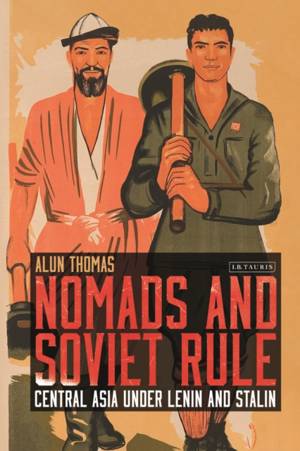
- Afhalen na 1 uur in een winkel met voorraad
- Gratis thuislevering in België vanaf € 30
- Ruim aanbod met 7 miljoen producten
- Afhalen na 1 uur in een winkel met voorraad
- Gratis thuislevering in België vanaf € 30
- Ruim aanbod met 7 miljoen producten
Omschrijving
The nomads of Central Asia were already well accustomed to life under the power of a distant capital when the Bolsheviks fomented revolution on the streets of Petrograd. Yet after the fall of the Tsar, the nature, ambition and potency of that power would change dramatically, ultimately resulting in the near eradication of Central Asian nomadism.
Based on extensive primary source work in Almaty, Bishkek and Moscow, Nomads and Soviet Rule charts the development of this volatile and brutal relationship and challenges the often repeated view that events followed a linear path of gradually escalating violence. Rather than the sedentarisation campaign being an inevitability born of deep-rooted Marxist hatred of the nomadic lifestyle, Thomas demonstrates the Soviet state's treatment of nomads to be far more complex and pragmatic. He shows how Soviet policy was informed by both an anti-colonial spirit and an imperialist impulse, by nationalism as well as communism, and above all by a lethal self-confidence in the Communist Party's ability to transform the lives of nomads and harness the agricultural potential of their landscape. This is the first book to look closely at the period between the revolution and the collectivisation drive, and offers fresh insight into a little-known aspect of early Soviet history. In doing so, the book offers a path to refining conceptions of the broader history and dynamics of the Soviet project in this key period.
Specificaties
Betrokkenen
- Auteur(s):
- Uitgeverij:
Inhoud
- Aantal bladzijden:
- 272
- Taal:
- Engels
- Reeks:
Eigenschappen
- Productcode (EAN):
- 9781788311557
- Verschijningsdatum:
- 30/09/2018
- Uitvoering:
- Hardcover
- Formaat:
- Genaaid
- Afmetingen:
- 145 mm x 218 mm
- Gewicht:
- 458 g

Alleen bij Standaard Boekhandel
Beoordelingen
We publiceren alleen reviews die voldoen aan de voorwaarden voor reviews. Bekijk onze voorwaarden voor reviews.











